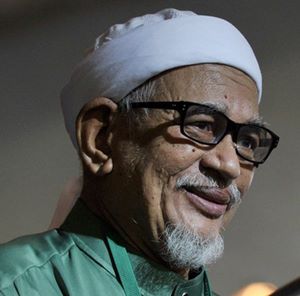Hadi: Political parties in Malaysia should form national unity government
(Today Online) – With both the ruling and opposition coalitions in disarray and Malaysian politics in a state of flux, all political parties should consider forming a national unity government, said the leader of Parti Islam Se-Malaysia (PAS).
In an interview with TODAY this week, PAS president Datuk Seri Abdul Hadi Awang blamed the political uncertainties on the United Malays National Organisation (Umno), the country’s largest party that leads the Barisan Nasional (BN) ruling coalition.
“What is happening is due to the weakness of Umno itself. It’s not due to Mahathir, Najib, nor Abdullah Badawi,” he said, referring to Prime Minister Datuk Seri Najib Razak and his two predecessors, Tun Abdullah Ahmad Badawi and Tun Dr Mahathir Mohamad.
Hadi, 67, said it was not too late for “a correction can be made” in the form of a unity government involving all major political parties and no opposition.
It was an idea he had first proposed in 2008, following the country’s 12th general election, when political wrangling in a series of by-elections led him to call on lawmakers to focus on serving the people instead.
While his proposal did not gain traction at the time, he believes that there is a greater need for national reconciliation now.
“What I feel today is that a change must be made. We are aware that in Umno, there are still capable individuals. Just that there are trapped in the situation now. I would suggest that all the parties come together to save the country,” he said.
Hadi’s call follows a recent proposal of a bipartisan Save Malaysia pact made by another opposition leader, Lim Kit Siang of the Democratic Action Party (DAP).
In recent weeks, Umno has been rocked by a public spat between Najib and Dr Mahathir, who has repeatedly called for the prime minister’s resignation over issues such as the debt-laden state-owned strategic development firm 1Malaysia Development Berhad. Ties in the three-party opposition Pakatan Rakyat have also been strained over PAS’s push to implement hudud, or Islamic criminal law, in Kelantan. Both DAP and Parti Keadilan Rakyat (PKR) say the move is not part of the pact’s common policy framework, with DAP going so far as to cut off ties with Hadi and saying that he had betrayed the pact.
When asked about this, Hadi downplayed the spat with its coalition partner, which it said was trying to shore up support among its Chinese voter base in view of the upcoming state elections in Sarawak.
“What happened with DAP is short-term. DAP is just making PAS a punching bag” he said.
Under hudud, punishment includes cutting off hands for theft and stoning to death for extramarital sex. Hadi stressed that strict conditions have to be met before punishments can be meted out, and hudud is not applicable to non-Muslims.
On why PAS is pushing to implement it in Kelantan, Hadi said: “It is to enforce morality and peace for everyone. Hudud law will instil fear, but those with no intention to commit crime need not fear.”
He added that PAS’s decision to introduce hudud was done democratically. It was also not a new initiative, as the party has historically made the promulgation of an Islamic state and implementation of Islamic laws (including hudud laws) its objective.
“Islam is not just a religion. It is a way of life,” he said.
PAS-ruled Kelantan passed key amendments to its Syariah criminal code on March 19, in a move to enable the eventual of hudud in the Malay-majority state. Hadi has since submitted a private member’s Bill to Parliament to amend the country’s Constitution so that hudud can be incorporated into Kelantan’s Syariah laws. The Bill will be debated during the next parliamentary sitting from May 18 to 28.
The hudud bill aside, Hadi’s next goal will be to retain his PAS president post which he has held since 2002 at the party’s general assembly in June. Having garnered far more nominations than any candidate, he is in a commanding position to do so — reflecting how leadership by the ulama (religious scholars and clerics) continues to be favoured by the members of the Islamist party.
PAS has been marred by internal conflict in recent years between its two key factions — the more conservative ulama wing and the more reformist professionals. Both sides hold different views on the implementation of hudud and whether PAS should continue to work with the PR pact or to chart its own political path . Some observers have suggested that June’s annual meeting could see a huge clash between the two factions, a notion dismissed by Hadi, who said that both groups have co-existed for years in the party.
“We share a common goal to uphold Islam as a way of life,” he added.
Hadi was in Singapore this week to speak on hudud at a talk organised by the S Rajaratnam School of International Studies Malaysia Programme.


